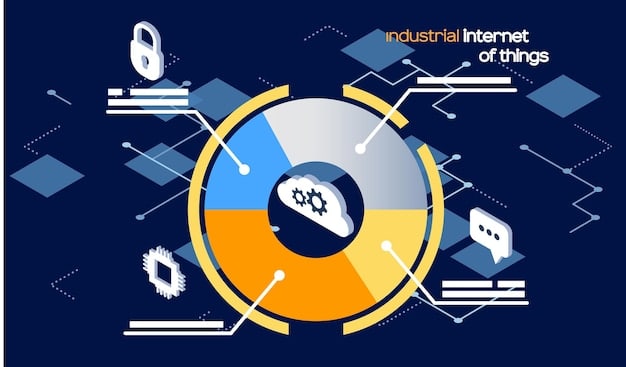2025 Podcast Ad Regulations: Impact on Your Revenue Streams

The updated 2025 podcast advertising regulations will significantly reshape revenue streams for creators and advertisers, necessitating strategic adjustments in content monetization, transparency, and compliance to maintain profitability and audience trust.
As the digital audio landscape rapidly evolves, the upcoming 2025 podcast advertising regulations are poised to bring substantial shifts to how content creators and advertisers operate. Understanding these changes isn’t just about compliance; it’s about proactively safeguarding and optimizing your revenue streams in an environment increasingly focused on transparency, data privacy, and ethical advertising practices.
Understanding the Shifting Sands of Podcast Advertising
The podcast industry has experienced meteoric growth, transforming from a niche medium into a significant advertising powerhouse. This rapid expansion, however, has also brought increased scrutiny from regulatory bodies concerned with consumer protection, data privacy, and fair trade practices. The 2025 regulations are not an isolated event but a culmination of ongoing efforts to bring digital advertising, including podcasting, under a more standardized and transparent framework. This section delves into the foundational concepts driving these regulatory changes.
The Rise of Programmatic Advertising in Podcasting
Programmatic advertising has revolutionized how ads are bought and sold, bringing efficiency and scale to the podcasting world. This automated system uses data and algorithms to serve targeted ads to specific listener demographics. While highly effective, its reliance on listener data has raised red flags regarding privacy. The 2025 regulations are expected to impose stricter guidelines on how this data is collected, stored, and utilized, directly impacting the targeting capabilities that programmatic advertising currently offers. Publishers and advertisers will need to re-evaluate their data strategies to ensure compliance, potentially shifting towards more anonymized data sets or contextual targeting methods.
Compliance with these new data handling rules is not merely a legal obligation; it’s a matter of maintaining listener trust. Audiences are increasingly aware of their digital footprint, and a breach of privacy, or even perceived intrusive targeting, can lead to listener churn.
- Data Anonymization: Expect a greater emphasis on techniques to protect listener identities.
- Consent Mechanisms: Clearer, more explicit consent will likely be required for data collection.
- Contextual Targeting: A possible resurgence in ads aligned with podcast content rather than listener profiles.
The Blurred Lines: Native Advertising and Endorsements
Podcast hosts often have a deeply personal connection with their audience, making host-read ads and native content incredibly persuasive. This authenticity, however, can also create ambiguity if listeners cannot easily distinguish between editorial content and paid promotions. The 2025 regulations are anticipated to crack down on unclear disclosures, requiring more explicit “advertisement” or “sponsored content” markers. This move aims to protect consumers from deceptive marketing practices, ensuring they are always aware when they are being pitched a product or service. For podcasters, this means rethinking how sponsorships are integrated to be transparent without sacrificing authenticity.
Advertisers, too, will need to adapt their strategies, potentially focusing on more organically integrated content that still clearly signals its promotional nature. This might involve earlier and more frequent disclosures within the audio or show notes. The goal is to build long-term trust, which ultimately benefits both creators and brands.
The evolving regulatory landscape demands a proactive approach from all stakeholders in the podcast ecosystem. Understanding where these changes originate is the first step toward crafting resilient and compliant monetization strategies. Ignoring these shifts could lead to significant financial penalties and reputational damage.
Key Areas of Regulatory Focus for 2025
The upcoming regulations in 2025 will address a range of issues, primarily centered around consumer protection, data privacy, and advertising transparency. These areas have been under increasing scrutiny across all digital media, and podcasting is now firmly in the spotlight. For creators and advertisers, a deep dive into these specific focal points is crucial for preparedness.
Data Privacy and Listener Tracking
Enhanced data privacy legislation, following precedents like GDPR and CCPA, is expected to govern how podcast platforms and advertisers collect and use listener data. This could impact everything from IP address tracking to device fingerprinting. The intent is to give listeners more control over their personal information, limiting the scope for highly granular targeting without explicit consent. Podcasts relying heavily on detailed demographic data for ad placement may need to explore alternative measurement and targeting methods. This shift encourages a move towards aggregated, anonymized data, or a greater emphasis on first-party data acquired directly from listeners through surveys or direct engagement, always with transparent consent.
The implications for smaller independent podcasters might be less immediate than for larger networks or platforms with sophisticated ad tech. However, even smaller creators who utilize analytics tools should be aware of data handling practices.
- Consent Management: New tools and processes may be required to obtain and manage listener consent.
- Data Minimization: Companies will likely be encouraged to collect only the data truly necessary.
- Reporting Standards: Expect changes in how ad campaign performance can be tracked and reported given data limitations.
Advertising Disclosure and Transparency
One of the most significant anticipated changes revolves around clear and conspicuous disclosure of sponsored content. While the Federal Trade Commission (FTC) already offers guidelines, the 2025 regulations are likely to codify these into stricter rules, potentially with more stringent enforcement. This means explicit verbal disclosures during host-read ads, clear labeling in show notes, and potentially even standardized audio cues to signal when an ad segment begins. The aim is to eliminate any ambiguity for the listener about whether something is editorial content or a paid promotion.
For podcasters, this may require adjustments to scripting and production workflows to ensure disclosures are not only present but also prominent and easily understood. Advertisers will need to ensure their campaigns are designed with this level of transparency in mind from the outset.
The principle guiding these regulations is that an average consumer should be able to instantly recognize when they are being advertised to. This protects vulnerable listeners and maintains the integrity of the podcast as a trusted source of content.
Impact on Podcast Revenue Streams: Challenges and Opportunities
The updated 2025 podcast advertising regulations will undoubtedly present a dual landscape of challenges and opportunities for those reliant on podcast revenue. Navigating this new terrain effectively will differentiate the thriving from the faltering in the coming years.
Challenges: Navigating Compliance and Reduced Targeting
The primary challenge for podcasters and advertisers will be ensuring full compliance. Regulatory oversight often comes with increased administrative burden and potential legal costs, especially for entities that fail to adapt quickly. Fines for non-compliance could erode revenue, making careful adherence essential. Furthermore, stricter data privacy rules leading to reduced targeting capabilities could negatively impact ad effectiveness. Advertisers might see lower conversion rates if they can no longer reach highly specific audiences with the same precision, potentially leading to a decrease in ad spend or a demand for lower rates. This could particularly affect creators whose niche content thrived on precise audience matching for advertisers.
Operational adjustments will be necessary, from updating internal policies to investing in new technology for data management or ad serving. The learning curve for these changes might also strain resources.

Opportunities: Building Trust and Innovative Monetization
Despite the challenges, these regulations also present significant opportunities. Explicit transparency in advertising can bolster listener trust, a crucial asset in the intimate medium of podcasting. Audiences who feel respected and know exactly when they’re listening to an ad are more likely to remain engaged and receptive to sponsored messages. This enhanced trust can lead to stronger listener loyalty, forming a more stable and valuable audience base. For advertisers, increased transparency can translate into campaigns that are not only compliant but also more ethical and, ultimately, more effective long-term because they resonate with a trusting audience.
The shift away from hyper-targeting based on personal data could also spur innovation in contextual advertising. Podcasters can leverage their deep understanding of their content and audience to attract advertisers whose products genuinely align with the show’s themes and values. This leads to more authentic and less intrusive ad experiences, which can improve listener satisfaction and ad recall.
- Direct-to-Consumer Models: Stronger listener relationships might support more subscription, membership, or merchandise sales.
- Brand Partnerships: A focus on authentic content integration and long-term brand relationships over transactional ad buys.
- Creative Ad Formats: Development of new ad formats that are both compliant and engaging, perhaps leveraging interactive elements.
The strategic response to these regulations will define future success in the podcast industry. Those who view compliance not as a burden but as an opportunity to innovate and deepen audience relationships are best positioned to thrive. Proactive adaptation and creative problem-solving will be key.
Strategies for Podcasters: Adapting to the New Landscape
For podcasters, adapting to the 2025 advertising regulations requires a multi-faceted approach. This isn’t just about avoiding penalties; it’s about refining your monetization strategy to be resilient, ethical, and audience-centric. Focusing on clarity, diversification, and listener engagement will be paramount.
Enhancing Transparency and Disclosure Practices
The most direct response to upcoming regulations on advertising transparency is to embed clear disclosure practices into your content strategy. This means going beyond minimal requirements and making it unequivocally clear to your audience when content is sponsored or promotional. For host-read ads, this could involve a standard, explicit verbal disclosure at the beginning and end of the ad segment. In show notes, ensure sponsored sections are prominently marked. Some podcasters might even consider visual cues on their website or app interfaces if their distribution platforms allow for it. The goal is to build a reputation for honesty, which solidifies listener trust—an invaluable asset in the long run.
Moreover, clearly communicating *why* you have sponsors can help. Explaining that sponsorships enable you to produce high-quality content can foster understanding and appreciation, rather than annoyance.
Being proactive in transparency now can position you favorably when the regulations fully come into effect.
Diversifying Revenue Streams Beyond Traditional Ads
Over-reliance on traditional programmatic or host-read ads makes podcasters vulnerable to regulatory shifts. Diversifying your income becomes a critical strategy. This includes exploring listener-supported models like Patreon or paid subscriptions, selling merchandise, offering premium content, or hosting live events. These alternative revenue streams leverage the strong community bond often found in podcasting and are less susceptible to advertising regulation shifts. They also provide a more direct relationship with your most loyal listeners, offering valuable direct feedback.
This approach requires investing in community building and offering unique value propositions to your audience. The goal is to create multiple, stable pillars of income, ensuring that a change in one area doesn’t jeopardize your entire operation.
- Listener Support: Offer bonus episodes, ad-free listening, or exclusive content via platforms like Patreon.
- Merchandise: Design and sell items related to your podcast brand.
- Premium Content: Create paid courses, workshops, or special series.
- Live Events: Host virtual or in-person events for your community.
Investing in First-Party Data and Audience Engagement
With restrictions on third-party data collection, podcasters should prioritize building their first-party data assets. This means actively engaging listeners through newsletters, surveys, or dedicated community platforms. By directly asking your listeners about their preferences, demographics, and interests (with explicit consent), you can gather valuable, compliant data. This information can then be used to inform your content strategy, understand your audience better, and offer advertisers more targeted (and ethical) opportunities based on declared interests rather than inferred data.
Building this direct relationship also deepens audience loyalty and provides direct channels for feedback, making your podcast more responsive and community-driven. It transforms listeners from passive consumers into active participants.
Strategies for Advertisers: Navigating the New Landscape
For advertisers, the 2025 podcast advertising regulations necessitate a recalibration of strategies to maintain campaign effectiveness and ensure compliance. This involves a shift from purely data-driven targeting to a more nuanced approach that prioritizes context, authenticity, and transparent engagement with listeners.
Prioritizing Contextual Relevance Over Hyper-Targeting
With potential limitations on granular listener data, advertisers will need to place a greater emphasis on contextual relevance. This means thoroughly researching podcasts whose content, themes, and discussions naturally align with their product or service. Instead of relying solely on demographic targeting gleaned from listener data, the focus shifts to the inherent audience of a particular show. An energy drink brand, for instance, might sponsor a fitness podcast because its audience is inherently interested in health and performance, regardless of specific demographic data points. This approach not only ensures compliance but can also lead to more authentic ad experiences, as the product feels like a natural fit within the content.
Developing deep relationships with podcasters to understand their audience nuances and content calendar will become increasingly valuable. This allows for more organic integration of ad messages.

Embracing Creative and Integrated Ad Formats
The regulations might spark a new era of creativity in podcast advertising. Advertisers should move beyond boilerplate ad reads and explore more integrated, narrative-driven formats. This could include long-form content collaborations, sponsored segments that genuinely add value to the show, or even co-creation of mini-series. The goal is to make advertising less interruptive and more of an organic part of the listening experience, while still maintaining clear disclosure. For example, a financial services brand might sponsor a recurring segment about personal finance tips, presented in the host’s authentic voice.
These formats can be highly effective because they tap into the unique intimacy of podcasting, leveraging the host’s trusted voice to deliver messages that resonate deeply with the audience.
- Brand Storytelling: Collaborate with podcasters to weave your brand into engaging narratives.
- Educational Content: Sponsor segments that offer valuable information related to your product.
- Interactive Campaigns: Explore opportunities for listener participation in sponsored content.
Collaborating Ethically with Podcasters and Platforms
A strong, ethical partnership between advertisers and podcasters will be more crucial than ever. Advertisers should work closely with creators to ensure ad disclosures are clear and that sponsored content respects both the show’s integrity and listener expectations. This collaborative approach extends to platforms as well, engaging with them to understand new compliance features and data reporting standards. Prioritizing long-term relationships built on mutual respect and transparency will lead to more sustainable and effective campaigns.
Investing in these relationships means being flexible, supporting podcasters in their compliance efforts, and valuing the unique connection they have with their audience. This responsible partnership can become a competitive advantage in a regulated market.
By embracing these strategic shifts, advertisers can not only navigate the 2025 regulations successfully but also forge stronger, more impactful connections with the highly engaged podcast listening audience.
The Role of Technology and Platforms in Navigating Regulations
The upcoming 2025 podcast advertising regulations aren’t just about manual adjustments; technology and the platforms themselves will play a crucial role in facilitating compliance and maintaining revenue streams. From ad servers to analytics tools, the tech ecosystem will need to evolve, offering solutions that empower both podcasters and advertisers to meet new standards.
Ad Servers and Analytics: Adapting for Compliance
Podcast ad servers, which dynamically insert ads into episodes, will be at the forefront of compliance efforts. These servers will likely need to integrate new functionalities to manage consent mechanisms, ensure proper disclosure, and potentially restrict certain targeting methods based on updated data privacy rules. Publishers will rely on these platforms to programmatically ensure that ads are not only delivered efficiently but also legally and ethically. Expect updates to how impression tracking and listener data are reported, moving towards more privacy-centric metrics that still provide valuable insights without compromising individual data.
Analytics platforms will also need to adapt, offering aggregated and anonymized data views that comply with regulations while still enabling advertisers to measure campaign effectiveness. This might involve a shift towards more contextual performance indicators rather than solely individual-level tracking.
The development of user-friendly dashboards that clearly illustrate compliance status will be a significant asset for creators and agencies.
Platform Responsibilities and Support for Creators
Major podcast hosting platforms and distributors bear a significant responsibility in helping creators navigate the new regulatory landscape. They are ideally positioned to develop tools and resources that simplify compliance. This could include:
- Automated Disclosure Tools: Features within the platform that allow podcasters to easily tag sponsored segments or integrate standardized disclosure messages into their audio.
- Consent Management Systems: Built-in frameworks for gathering and managing listener consent for data collection, making it easy for podcasters to stay compliant.
- Educational Resources: Providing webinars, guides, and best practices to help creators understand and implement new regulations.
- Updated Ad Marketplace Rules: Adjusting their internal ad marketplaces to prioritize campaigns that meet the new transparency and data standards.
Platforms that proactively support their creators in these areas will likely foster greater loyalty and build a more robust, compliant ecosystem. Their role extends beyond simple hosting to becoming essential partners in ethical monetization.
Collaboration between platforms, industry bodies, and regulators will be key to developing practical and effective solutions that benefit the entire podcast community. The future of podcast advertising will be shaped not just by rules, but by the technological innovation that helps adhere to them.
The Future of Podcast Advertising: Beyond 2025
Looking beyond 2025, the podcast advertising landscape is set to continue its evolution, driven by both regulatory pressures and advancements in technology and consumer expectations. The period following these new regulations will necessitate ongoing vigilance and adaptation as the industry matures.
Continuous Evolution of Standards and Best Practices
The 2025 regulations should not be viewed as a static endpoint but rather a milestone in the continuous evolution of digital advertising standards. As technology advances and consumer behaviors shift, further amendments and new regulations are likely. Podcasters and advertisers will need to foster a culture of continuous learning and adaptation, staying informed about industry best practices and emerging legal precedents. This proactive engagement will be critical for long-term sustainability and growth. Industry bodies, such as the IAB (Interactive Advertising Bureau), will continue to play a vital role in interpreting regulations and disseminating best practices, offering guidance that helps the entire ecosystem adapt.
The conversation around data privacy and consumer trust is unlikely to fade, suggesting that future regulations might delve even deeper into areas like AI ethics in ad targeting, or personalized content recommendations.
The Enduring Value of Authenticity and Listener Trust
Perhaps the most crucial takeaway from the 2025 regulations is the reinforcement of authenticity and listener trust as the ultimate currency in podcasting. In an environment where data targeting might become more restrictive, the genuine connection between a host and their audience becomes even more valuable. Advertisers willing to invest in podcast partnerships that feel organic and respectful of the listener will likely see the greatest returns. This means valuing the unique voice of a podcast, embracing transparency, and focusing on creative integrations that genuinely resonate with the show’s community.
Podcasters who consistently prioritize their audience’s experience, providing high-quality content and transparently engaging with sponsors, will cultivate a loyal following that is less susceptible to market fluctuations and regulatory changes. This deep connection is not only good for building a brand but also provides a resilient foundation for long-term revenue.
- Community Building: Investing in platforms and initiatives that foster a strong sense of community around the podcast.
- Content Quality: Consistently delivering engaging, well-produced content that keeps listeners coming back.
- Ethical Partnerships: Choosing sponsors whose values align with the podcast and its audience, enhancing credibility.
The future of podcast advertising will, therefore, be a blend of technological innovation and a return to fundamental ethical principles. Those who master this balance will thrive in the landscape beyond 2025.
| Key Point | Brief Description |
|---|---|
| 📊 Data Privacy | Anticipate stricter rules on listener data collection and usage, impacting programmatic targeting. |
| 📣 Transparency | Mandatory clear and conspicuous disclosure for all sponsored content and native ads. |
| 💰 Revenue Diversification | Podcasters should explore listener support, merchandise, and premium content to mitigate ad reliance. |
| 🤝 Ethical Collaboration | Advertisers and podcasters must foster transparent partnerships to build and maintain listener trust. |
Frequently Asked Questions About 2025 Podcast Ad Regulations
The primary goals of the 2025 regulations are to enhance consumer protection, safeguard data privacy for listeners, and ensure greater transparency in advertising disclosures. These measures aim to prevent deceptive practices, give listeners more control over their personal information, and clearly differentiate between editorial content and paid promotions, fostering a more trustworthy advertising environment overall.
The regulations are expected to impose stricter rules on how listener data, such as IP addresses and device information, is collected and utilized. This will likely necessitate more explicit consent mechanisms and encourage a shift towards anonymized data or contextual targeting. Advertisers might face limitations on highly granular audience segmentation, requiring adaptation in how they measure and optimize campaigns.
Podcasters should immediately audit and update their ad disclosure practices. This includes implementing clear verbal disclosures at the start and end of all sponsored segments, prominently labeling sponsored content in show notes, and ensuring that any native advertising is obviously identifiable as promotional material. Proactive and unambiguous transparency builds listener trust and helps prevent potential non-compliance issues.
While the regulations introduce new constraints, they are more likely to redirect innovation rather than stifle it. The shift towards greater transparency and potentially less hyper-targeting will encourage advertisers to develop more creative, integrated, and contextually relevant ad formats. This can lead to more engaging and less intrusive advertising experiences that resonate deeply with audiences, ultimately pushing the industry towards more sustainable and ethical practices.
Podcasters can maintain and even grow revenue streams by diversifying away from sole reliance on traditional advertising. Strategies include fostering listener-supported models like paid subscriptions or Patreon, selling merchandise, offering premium content, and building strong brand partnerships for integrated sponsorships. Investing in first-party data collection with consent and prioritizing audience engagement are also key to securing alternative, resilient monetization paths.
Navigating the Evolving Soundscape: A Concluding Thought
The updated 2025 podcast advertising regulations mark a significant inflection point for the industry. While they undoubtedly introduce new complexities and compliance requirements, they also herald an era where transparency, ethical practices, and listener trust are paramount. For podcasters and advertisers alike, success in this evolving landscape will hinge on a proactive approach: embracing robust disclosure, diversifying revenue models, and fostering authentic, value-driven relationships with audiences. Those who adapt strategically, viewing compliance not as a burden but as an opportunity to innovate and deepen connections, are best positioned to thrive and continue to realize substantial revenue from the powerful medium of podcasting.





